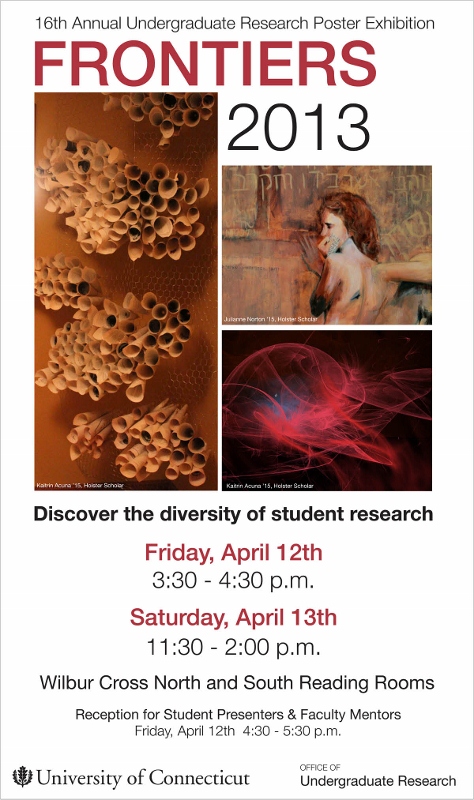University of Connecticut
Office Undergraduate Research, Enrichment Programs
Program Coordinator (UCP V) (Search number 2013524)
Position Description:
The Program Coordinator of Office Undergraduate Research (OUR) contributes to University of Connecticut’s goal of providing undergraduate students with a wide range of opportunities to participate in academic enrichment activities throughout their collegiate careers. The Program Coordinator assists in all aspects of OUR operations.
The OUR is a part of the Enrichment Programs division. It is responsible for working with faculty and administrators based in all schools and colleges to promote and develop opportunities for undergraduate academic enrichment through research and creative activity; conducting open competitions for undergraduate research and creative endeavor awards; the administration of centralized funding for such activities; educating students and faculty about undergraduate research; and publicizing the accomplishments of undergraduate researchers.
The Program Coordinator will work with students, faculty, advisors, and academic administrators on undergraduate research issues. These duties include:
- Meet with and provide assistance to students who are interested in undergraduate research.
- Create, schedule, prepare materials for, and present workshops on undergraduate research and honors theses to undergraduates.
- Assist students in identifying opportunities for and preparing proposals and applications for internal and external research funding, including nationally competitive undergraduate research opportunities and other internships.
- Receive and review applications ensuring completeness and make referrals to appropriate personnel for review.
- Manage communications with students and advisors regarding outcomes of proposals.
- Maintain and enhance the OUR website to ensure accessibility, clarity, and educational value.
- Assist in the marketing and communication of OUR activities and funding programs to students, faculty, advisors, and other administrators.
- Process applications, paperwork and records. Maintain filing system.
- Manage workflow and contribute to quality improvement of forms and application materials.
- Process and maintain necessary paperwork, records, and files to support program, including fiscal records. Enhance electronic data systems, where appropriate.
- Work with University offices and the Foundation in the disbursement of funds to support undergraduate student research and creative endeavors.
- Assist in the execution of undergraduate research exhibitions and symposia (including the annual Frontiers in Undergraduate Research Poster Exhibition), designed to share and publicize undergraduate students’ research achievements. This activity includes advertising exhibitions, securing space, event planning, processing proposals, creating programs, and managing events.
- Assist in all functions relating to grant programs such as the Summer Undergraduate Research Fund competition, including updating and creating language for the website, presenting at workshops , assigning reviewers, attendance at meetings and note-taking on the comments for each applicant. Compile decision letters and work with Study Abroad to ensure compliance with University policies.
- Confer with and assist supervisor in the performance of program administration and activities. Assist in preparing program budgets and annual report for approval of supervisor and manage and monitor expenditures. Evaluate effectiveness of programs and recommend improvements or changes to appropriate manager.
- Prepare informational and promotional materials for use in outreach activities for all aspects of Office of Undergraduate Research work.
- Provide on-site supervision of events, oversee facilities use, provide support and assist in problem resolution.
- Assist with assessment efforts, assemble data, write and/or edits reports.
- Maintain a collection of resource materials and program information.
- May perform office support functions and projects, as assigned.
- Limited travel to relevant national conferences, regional events, and UConn regional campuses.
- Perform related duties as required.
Minimum Qualifications:
- Bachelors degree in an appropriate field.
- Three to five years’ experience in a responsible administrative support position that demonstrates knowledge of administrative methods;
- Experience in conducting independent research or scholarship;
- Demonstrated ability to work independently and regularly exercise sound judgment in addressing program issues;
- Ability to efficiently multitask and prioritize workload.
- Excellent communication, interpersonal, and organizational skills.
- Familiarity with computers as a skilled user of word processing programs and electronic data systems such as Word, Excel, Access, FileMaker and database reports.
Preferred Qualifications:
- Graduate degree in appropriate field, preferably in the sciences or social sciences;
- Familiarity with competitive grant and award programs;
- Experience working with faculty across disciplines;
- Experience in an undergraduate research office or honors program or college;
- Experience at a large university;
- Experience with Peoplesoft and other database software;
- Experience with data analysis, database design, and program evaluation;
- Experience in designing or updating web pages and social media using relevant software (e.g. Dreamweaver, WordPress, HootSuite).
To Apply:
For full consideration upload a letter of application, a resume, and a list of 3 professional references with contact information via Husky Hire (http://www.jobs.uconn.edu/). Include search number on all correspondence. Screening of applications will begin immediately and continue until position is filled.
The University of Connecticut is an EEO/AA employer.

